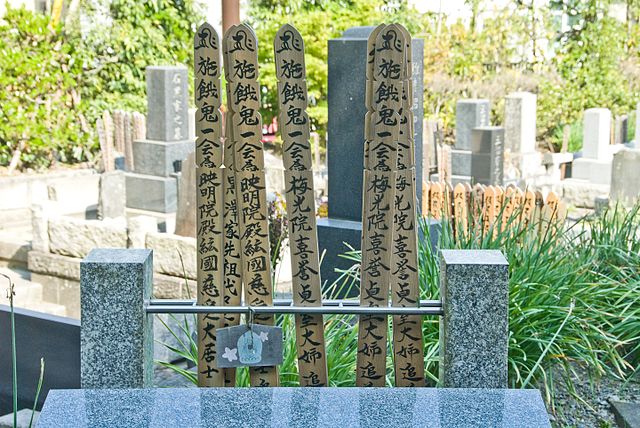When we lived in Japan, we learned that one aspect of a Buddhist funeral is that the priest creates a name (kaimyo) that is assigned to the dead person for use in the afterlife. There is also superstition that if the deceased isn’t given a proper send-off, he becomes a wandering spirit, who might possibly come back to commit mischief. So a poor send-off is to be avoided. Mourners take multiple precautions. The kaimyo may be written on wooden sticks at the gravesite, or on a plaque that’s put in the family altar or with the ashes.
This new name isn’t free. The better the name, the higher the price—even tens of thousands of dollars.
I couldn’t figure why a new name “for use in the afterlife” would even be needed. After all, if the Buddhist deceased has reached enlightenment and gone straight to nirvana (that is, extinction of the selfhood), there’d be no need for a new name at all, would there? I hadn’t realized that the origin of this practice probably had more to do with politics and greed than with belief. Apparently, use of the kaimyo started in the samurai days of the Tokugawa Period when people were required to register as Buddhists to show they weren’t Christian. And of course it was a good way to get money from the wealthy.
Those Japanese Buddhists who believe in reincarnation would value the kaimyo, I supposed, wanting their loved one to return (in the karmic cycle) as a high-level being rather than some lower form. Of course, if the person should live a number of lives, a different new name would have to be purchased at the end of each reincarnation.
Those details aside, the first thing that struck me about the kaimyo was that the name had to be bought. That the Buddhist temples are sure taking lots of money from nervous mourners.
Revelation 2:17 says that whoever is victorious (that is, belongs to the Lord) is given—not sold—a new name by the Lord himself. And 3:5 says that whoever lives for the Lord has his name written in the Book of Life. It will never be erased or forgotten. Done.
We hear all kinds of nonsense about Christianity being burdensome, rigid, limited, not fun… And in contrast, the sanitized version of Buddhism that’s presented to us appears to be all light and easy. It’s the other way around.




Oh, that was an excellent and educational article. In a few sentences you gave so much truth. The people on this earth know so little, about other religions and even about their own belief/church teachings. There is so much deception by religious leaders and they make it very difficult to even learn all that various systems consist of. My dear daughter has been caught up (thanks to her husband) in Calvinism for 20 or more years and he and their “cult” have nearly eliminated her family from their lives. I have witnessed what Calvinism is and what it does to people and it’s like a version of The Body Snatchers. My daughter disappeared and a totally different person now inhabits her body and as of last Friday I now know, from her lips, that she loves me but wants me to be a different person. She dislikes me as I am. I guess I need the help of a body snatcher also.
I’m very sorry, C, about what you’re going through. Yes, the main thing is what the Bible says–not what other people think. So we always have to go back to the Bible. Just a tiny caution. “Calvinism” has some variations. And people these days may use a term while each person has given it a different meaning. So we need to be careful about calling something a cult or of implying that everyone in a certain group believes a certain thing. For example, the Roman Catholic Church has very specific official teaching, but my neighbor may call himself a Catholic and not even believe those things. I might suggest that you talk with your daughter about individual points of teaching, looking at the Bible, rather than going after the “ism” itself. Press on!
Great lesson, Lynn!
Great insight into the fear and superstition that inhabits Buddhist beliefs. Imagine thinking that a beloved grandparent might come back and haunt you if you didn’t pay thousands of dollars! Ugh.
Our battle is not against flesh and blood but against the ancient deceptions thrust upon these wonderful people.